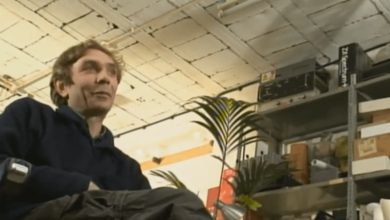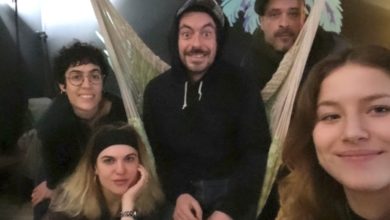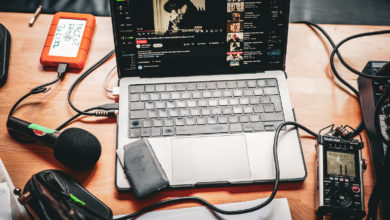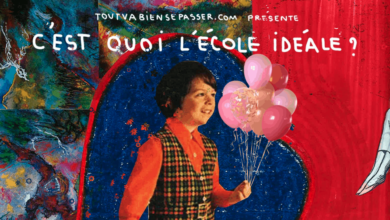Alexei Blinov (10 July 1965 – 26 November 2019[citation needed]) was a London-based electronic engineer and new media artist working out of Raylab in Hackney. As founder of experimental new media organisation « Raylab » he has collaborated with a number of creative artists including Jamie Reid.
He was trained as a doctor before moving to the UK. In the early 1990s he specialised in large scale high quality laser projections.[1] Since the late 1990s he has produced a wide variety of interactive audio-visual installations. Over the past few years, he has been the creative force behind many interactive audio-visual art projects in the UK.
Between 1993 and 1996 he worked extensively in the Netherlands, creating laser projections for scientific events, music and arts festivals and for dance companies. Since 1997 he has worked mainly in the UK creating interactive audio-visual installations at a number of important art galleries including the ICA, London and the Barbican Art Centre, London. Collaborations include Ciron Edwards.
From 2006-2016 he led the technical development for feature film Dau – life and times of physicist Lev Landau, on set in the Ukrainian border city Kharkov where he revisited many period experiments and engineered his own to feature in the film. The movie is one of Russia’s largest and most controversial cinematic projects to date.[2]
He engaged with new media projects based on wireless networking such as WiFi, and was a well known and respected I/O specialist with a passion for high voltage and radio frequency experimentation. Blinov researched electro stimulation of neural feedback and blockchain resourcing.
He has exhibited a selection of these HT experiments including the ‘Hairpin Circuit’ at Moscow University. A set of spectacular arctic ICE core holographic images were recently exhibited in St Petersburg.
Alongside Ilze Black[3] and Martin Howse, he was a member of TAKE2030, a brave new media society that operated in parallel net media scheme. The London based collective produced public art projects, shifting social network missions into hypermedia playing fields. Past projects include RichAir2030, UK, EU (2003-2004) and Lets do Lunch, London (2005). Blinov had deep ties with the Open Wireless Network community between Moscow, London and Berlin, collaborating with Jamie Reid, Empress Stah, Shu Lea Cheang, Nancy Mauro-Flude and many others.
He died on 26 November 2019 following complications from pancreatic cancer.
La transcription automatique par TRANSCRIPTIVE:
00:00:02:09
It’s nothing in the warfare.
00:00:05:05
It’s like something completely different.
00:00:12:07
Well, you don’t have to assume that you can define what’s the intellectual properties and some other way, other than the led to that.
00:00:22:05
So I don’t share with anyone keep in mind that they probably defeat the very granular literature of having information on the first place.
00:00:34:03
Cause I do believe that it must be him, decided society is complex enough to require making mechanism, which controls or which somehow, or periods addresses the issue of ideas floating about well is quite unfortunate to do me that the moms or the people who will have lots of free money to spend on such toys like robots or artificial intelligence and communication facilities are the mean to people.
00:01:08:02
They’re like what?
00:01:09:08
It’s not strong, why that’s not to a doctors without borders.
00:01:14:07
They kind of go hardly can contain themselves.
00:01:20:05
So there’s all these United nations flooded bunnies at all.
00:01:23:06
So unfortunately people who’s gotten the money out for some excuse these days to move any amount of stuff from point a to point B three is like easy to leave that information from point a to point B is even easier on one to the other it’s happening.
00:01:45:07
It’s happening in such a mass quantity, that there is new function for these kinds of, uh, protection.
00:01:55:09
Janitorial protection is normal.
00:01:58:02
It’s kind of senseless is like thin, which is there some trade GT zone arrangements or something like that.
00:02:08:00
That’s what it does.
00:02:09:14
There’s no, any other sense rather than instruments, that thing is there.
00:02:26:09
And as soon as they take control over it and assume that they label be in control of it, otherwise somebody else comes and takes control over the phone with him.
00:02:41:14
I just know that I’m kind of scaring anybody away or anything like that.
00:02:46:06
He was like, I was things happening.
00:02:48:08
We’re trying to work on the case.
00:02:50:06
You can get about eight.
00:02:53:01
It takes you a while to catch up.







